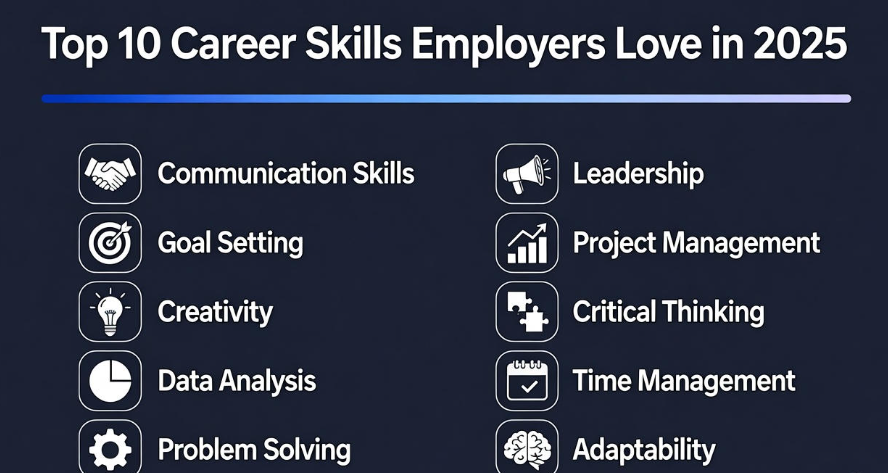Time management isn’t just a buzzword you hear in seminars or read about in productivity blogs. It’s a practical skill that can completely change how you work, reduce stress, and make you more efficient. Every employee, whether in an office, remote work, or field job, needs to master the art of managing their time wisely. Let’s explore these skills in a way that’s easy to understand and apply.
Why Time Management Matters
Most employees think they are busy, but being busy doesn’t always mean being productive. Time management helps you focus on the right tasks, meet deadlines, and reduce unnecessary stress. When you manage your time well, you can:
-
Achieve more with less effort
-
Reduce anxiety about unfinished tasks
-
Improve work-life balance
-
Become a more reliable team member
Think about it like this: if you don’t control your time, your tasks control you. And nobody wants that.
Prioritization: Knowing What Comes First
Not every task is equally important. Some are urgent, while others can wait. Prioritizing helps you focus on what truly matters. A simple way to do this is using the Eisenhower Matrix:
| Task Type | Description | Action |
|---|---|---|
| Urgent & Important | Needs immediate attention | Do it now |
| Important but Not Urgent | Long-term goals, planning | Schedule it |
| Urgent but Not Important | Interruptions, small tasks | Delegate if possible |
| Not Urgent & Not Important | Time-wasters | Avoid or eliminate |
By categorizing tasks, you stop wasting time on things that don’t contribute to your goals.
Setting Clear Goals
Without goals, time management is like sailing without a compass. Clear goals guide your daily activities. Use the SMART method:
-
Specific: Be clear about what you want
-
Measurable: Track your progress
-
Achievable: Set realistic targets
-
Relevant: Align goals with your job
-
Time-bound: Give yourself a deadline
Even small goals, like completing three high-priority tasks before lunch, can create a sense of accomplishment.
Planning Your Day
Planning is crucial. Employees who plan their day are less likely to procrastinate. Start your day by:
-
Listing tasks for the day
-
Ranking them by priority
-
Allocating specific time slots
A simple table for daily planning:
| Time | Task | Priority | Notes |
|---|---|---|---|
| 9-10 AM | Check emails | Medium | Only urgent emails |
| 10-12 PM | Project work | High | Focused, uninterrupted |
| 12-12:30 PM | Lunch break | – | Recharge |
| 12:30-2 PM | Client meeting | High | Prepare agenda |
| 2-4 PM | Reports & Documentation | Medium | Limit distractions |
| 4-5 PM | Wrap up & Plan next day | High | Reflect and prioritize |
Notice how breaks are included. Effective time management isn’t about working nonstop; it’s about smart work.
Avoiding Procrastination
We all procrastinate sometimes. The trick is to understand why. Common reasons include:
-
Fear of failure
-
Task feels overwhelming
-
Lack of clarity
Simple solutions:
-
Break tasks into smaller steps
-
Start with a 5-minute commitment
-
Remove distractions like social media
Even starting small often leads to momentum that makes finishing easier.
Delegation: Not Everything Is Your Job
Many employees feel they must handle everything themselves. But smart employees know when to delegate. Delegation frees your time for more important tasks and empowers others in the team. Ask yourself:
-
Who can do this task equally well?
-
Is it time-sensitive for me or someone else?
-
Will delegating improve efficiency?
Time Tracking: Know Where Your Time Goes
You can’t manage what you don’t measure. Track your activities to identify time leaks. Tools like Toggl, RescueTime, or even a simple notebook help you see patterns. After a week, ask yourself:
-
Which tasks took longer than expected?
-
When did distractions occur?
-
Which activities gave the most value?
Managing Interruptions and Distractions
Interruptions are the enemy of focus. A few strategies to stay on track:
-
Use “Do Not Disturb” modes during deep work
-
Check emails and messages only at set times
-
Keep your workspace organized
-
Communicate your focus hours with colleagues
Even small adjustments can save hours weekly.
Effective Meetings
Meetings often eat up a huge chunk of time. Make them effective by:
-
Having a clear agenda
-
Inviting only necessary participants
-
Setting time limits
-
Summarizing action points
If meetings are poorly managed, they’re just productivity killers.
Using Technology Wisely
Technology can be a great time saver or a huge distraction. Leverage tools like:
-
Task managers: Trello, Asana, Notion
-
Calendar apps: Google Calendar, Outlook
-
Focus tools: Pomodoro timers, Forest app
But don’t let notifications control your day. Master the tools; don’t let them master you.

Work-Life Balance: Time Management Isn’t Just Work
Time management isn’t only about office productivity. Properly managing work hours allows time for family, hobbies, and rest. Balance prevents burnout, which ironically saves even more time in the long run.
Soft Skills That Help Time Management
Certain soft skills improve how you manage time:
-
Communication: Clarify expectations to avoid rework
-
Decision-making: Avoid overthinking and make timely choices
-
Self-discipline: Stick to schedules and resist distractions
-
Adaptability: Handle unexpected changes efficiently
Practical Tips to Improve Daily
-
Start your day with the most important task (“Eat the frog” method 🐸)
-
Limit multitasking; focus on one task at a time
-
Keep a daily journal to track accomplishments
-
Review your day before leaving work
Common Mistakes Employees Make
-
Overloading their to-do list
-
Ignoring breaks and rest
-
Failing to delegate
-
Not planning ahead
Correcting these mistakes drastically improves efficiency.
FAQs
Q1: How long should I spend planning my day?
A: 10-15 minutes in the morning is enough to list tasks, prioritize, and allocate time.
Q2: Can multitasking improve productivity?
A: Usually not. Focused work on one task is far more effective. Multitasking often reduces quality and increases stress.
Q3: How do I avoid procrastination if I feel overwhelmed?
A: Break tasks into smaller, manageable steps. Start with the easiest or most appealing part to build momentum.
Q4: Which tool is best for time tracking?
A: It depends on your needs. For simple tracking, a notebook works. For digital tracking, apps like Toggl or RescueTime are excellent.
Q5: How do I balance work and personal life while managing time?
A: Allocate clear work hours and stick to them. Schedule personal activities just like work tasks to ensure balance.
Conclusion
Time management is more than just scheduling; it’s about making conscious choices about where your energy goes. Employees who master these skills are more productive, less stressed, and enjoy better work-life balance. Start small, implement one or two strategies, and gradually adopt others. Over time, managing time effectively will feel natural. Remember, time is the one resource we can’t get back—so make it count.





